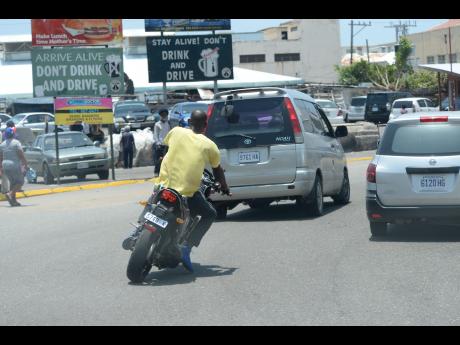The Road Traffic Act 2018, the RTA – which is still a bill – continues its journey to the statute books.
The Lower House of Parliament recently approved the proposed legislation. It now moves to the Senate. After it gets approved there, it will be sent to the governor general. He must sign it for it to become law.
When that happens, the current 80-year-old law will be invalid, and the new law will replace it. There were bursts of chatter about the new RTA on social media after the House of Representatives passed it.
Many persons in the discussions seemed unaware of the lawmaking process. They believe that the 2018 law is now in force.
There were two main points about the RTA in the social media chats and in this newspaper. One was that the proposed fines for violations would lead to increased income for corrupt members of the police force. ‘Expect more corruption’ was the headline of a February 12 Jamaica Observer article, but not a word about whether the law would change the behaviour of motorists and reduce the carnage on the roads.
Kelly McIntosh, an executive at one of the country’s leading companies, a former teacher and a guest columnist for this newspaper, wrote a piece that was informed by research, more thoughtful and constructive – ‘New traffic law not enough’.
Notably absent from these public discussions were comments from the insurance industry. In 2016, it paid claims totalling $56.1 billion. Some were the result of traffic accidents. The Insurance Association of Jamaica’s website proclaims: “IAJ occasionally becomes involved with matters that affect the wider society outside of providing coverage for the insurance-buying public.” Is behaviour of motorists not important for insurers to step outside their comfort zones? It is so much easier to raise premiums to recover claims costs from consumers.
The 2016-2017 attempts by this column to help shape the discussions about the RTA failed. The House lawmakers, in their wisdom, dismissed the ideas that I shared about the section of the bill dealing with cell phones and other electronic devices. The conversations have changed as the law moves inexorably towards its journey’s end. This article will also alter course. It will enter the social media discussions. It will also seek to add to the ideas that were shared by Ms McIntosh.
The conclusion in the Jamaica Observer article, though popular, is doubtful. It is based on what is commonly, but mistakenly, called a vox populi survey. This Latin phrase means voice of the people. Surveys of this type are often inaccurate if not done properly. This one was conducted posing the same question to several persons, who, it is assumed, were randomly selected.
The conclusion that police officers would be more prone to use the increased fines that are to be imposed under the RTA to corruptly collect money from motorists was expressed as a factual statement instead of as the belief of the persons who participated in the survey.
Questions about the RTA and police corruption were posed to seven persons. Survey practitioners will agree that this sample size is not representative of the population.
Analysis of the responses that were recorded in the article indicates that three persons (43 per cent of the group), believed that the new RTA would lead to more corruption. Two persons (29 per cent) felt that it would not. One person had no opinion (14 per cent), and another (14 per cent) believed that the proposed fines were too high.
Any first-year student studying basic research methods at our tertiary institutions would know that ‘there are lies, damned lies, and statistics’.




Leave A Comment